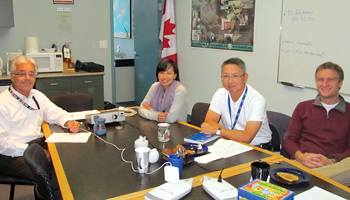
At the BOLD lab (L to R): Dr. David Sweet OC, Laura Mai, Hiron Poon (RCMP technical leader for the Biology Services Directorate, a component of Forensic Science and Identification Services) and Dr. Andre Marziali.
Bureau of Legal Dentistry (BOLD) graduate student Laura Mai is currently working with her supervisors, BOLD’s director Dr. David Sweet OC and Dr. Andre Marziali from Engineering Physics, to test an innovative technology to clean forensic DNA evidence from contaminated crime scenes. Developed by Marziali, SCODA (Synchronous Coeffi cient of Drag Alteration) promises to exact much better DNA profiles and outcomes from dirty forensic exhibits seized by police from crime scenes.
News of SCODA’s promise has circulated outside the UBC research labs, and now detectives from the Vancouver Police Department and homicide investigators from the RCMP have contacted Laura, seeking her assistance with problematic cases. Actual crime scene exhibits have been submitted to BOLD lab for her to test. In one extreme case, plans are underway for Laura to accompany police sleuths to the crime scene to advise them on how best to collect and preserve the contaminated trace evidence.
This interest in applying SCODA technology even before Laura’s research project is complete indicates its significant potential to assist in identifying and prosecuting criminals.